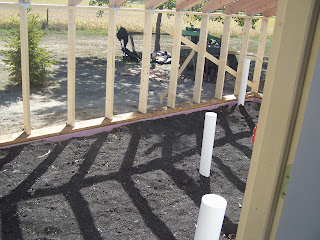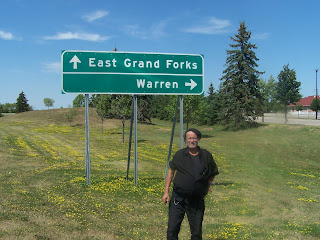Willmar League of Women Voters Speech- 04/09/12
Open
Rural America is colluding with those who would destroy it.
That's the bad news. I'll get to the good news.
I first became aware of this trend while researching a class I taught at the University of Minnesota, Morris-
Social and Ethical Implications of Technology.
This shouldn't have been a surprise. It's part of an overall trend in our society. Look at the election ads and corporate propaganda- human beings are not valued as persons, but as units of production and consumption to be used and manipulated.
This is called “Colonization.” It's what the European powers did to Africa, Asia and America in centuries past. They
turned living places into resource bases,
homelands into commodity dumps- not to serve the people there, but to serve powerful people somewhere else.
I'm pleased to see East African and Hispanic folks here- You know exactly what I'm talking about. It's being done to us, right here and right now- if in a sneakier way.
Problem
In their 2009 book,
Hollowing out the Middle, Patrick Carr and Maria Kefalas talked about the Rural Brain Drain, that how we educate our kids, how we train them to view rural life, ensures that the best and brightest grow up, excel in school, graduate- and leave. If they come back with “foreign ideas,” even wonderful ideas, it's an uphill battle to get anyone to listen to them.
But it isn't just education. We are doing the same thing with food- sending it away, and buying it back in inferior forms. We have some of the best soil on the planet, but many of our towns and counties are USDA-designated as
food deserts.
Most farmers today aren't growing food, but producing industrial feedstocks. Old MacDonald's farm is a thing of the past. Look beside the highway-Those aren't farms in the sense we all used to know, but factories: They use highly mechanized and energy-wasteful methods to extract commodities which are useless without intensive processing.
It isn't the farmers' fault- they know that the system is rigged against them, but what can they do?
According to a report by the Rural Economics Researcher Ken Meter of Crossroads Resource Center, once you compile all the numbers:
Nearly two-thirds of food consumed in Minnesota is produced out of state
and
Farmers (in Western Minnesota) lose $150 million each year producing food commodities, and also spend $ 600 million buying outside inputs, while consumers spend $ 250 million buying food from outside. This is a total loss of $1 billion of potential wealth each year. This loss amounts to 70 % of the value of all food commodities raised in the region.
So. We export our children through education. We export our soil, our water, and our true wealth through agriculture. This is not a good plan for long-term sustainability.
There is an oft-quoted Cree prophecy:
"When all the trees have been cut down, when all the animals have been hunted, when all the waters are polluted, when all the air is unsafe to breathe, only then will you discover you cannot eat money."
Relief
I should tell you who are at Garden Goddess. We're a good example of what's possible. We have seen huge changes in these last ten years:
Greenhouse/CSA Story:
In the Fall of 2002 we were getting our vegetables from the Easy Bean, a large CSA farm east of Milan, MN. When we opened that last box of the season, when we realized that we'd be dependent on grocery stores for “fresh” vegetables, Carol said, “Ya know, somebody ought to do something about this.”
“Somebody” soon became US. We spent three years in research, reading books, combing websites, visiting other installations, playing with and arguing over designs, before we came up with the Garden Goddess Greenhouse. We went back to first principles, as “standard” greenhouses are little changed from the first one built in 1843 in London. They are inefficient energy hogs. Our design uses something like 3% of the energy that a conventional greenhouse would. Others have built greenhouses based on our design, and their figures show the same savings.
In 2009 we published the Northlands Winter Greenhouse Manual. It's sold well, and is in its second printing. The book has led to requests for design help from all over North America, as well as Ireland, Bolivia, the Isle of Man, even Iran. Dozen or so greenhouses operating because of the book, and constantly hear second- and third-hand reports of others.
We've traveled tens of thousands of miles, presenting at conferences, conducting workshops, and helping others rethink their food options. We've spoken in big cities and teeny prairie villages. We've been before crowds of middle-aged hippies, and of tea-party enthusiasts. We've spoken with non-profits, farmers, and government officials. People have actually cried after some of our messages, since we brought them hope.
A concept that we've developed is “Building the Fifty Dollar Table.” When trying to recreate the food system into something more just and environmentally sound, you can't take on the big players in the current system, like Cargill and Monsanto, head-on. There is an old saying: “If someone asks you to sit down at the poker table, but they have $5000 and you have $50, DON'T SIT DOWN!” We are building that “other table” rather than playing an unwinnable game.
The most powerful force keeping things the way they are is ignorance. We believe that feeding ourselves is hard, maybe even illegal. We don't think that we can do much- but WE CAN DO MORE THAN WE THINK WE CAN. In our travels we've seen this time and again.
We've seen Community Gardens reduce crime and build community- what's more fundamental than food?
Neighborhood Gardens have created community among neighbors.
Locally prodeced foods have given small grocery stores a new lease on life.
West Central Minnesota is a hotbed of these activities, with dozens of local-food-dedicated producers, organizations providing training and support for them, and active projects to increase our ability to feed ourselves.
There are several worthy efforts in the Willmar area already:
Willmar High School runs a large greenhouse that we helped renovate from a semi-derilect unit on the MinnWest Technology Campus.
The East Side Farmers mMarket has been oiperating for decades, and is still going strong.
The Becker Avenue Farmers Market, right downtown, is a great operation, with a big year-opening event coming up next month.
The Community Owned Grocery, COG, is in its planning and fund-raising stage. It will be a full-range food store, with other services and products, centered on locally-produced goods, local ownership, and the local community.
So far, these are rather “traditional” ideas. But moving on from there:
According to the AURI (Agricultural Utilization Reasearch Institute) report-
“Minnesota Food Production Sector: Growing Green Jobs,” some of the growing opportunities are in:
Producing Local Foods: People increasingly want to know where their food comes from.
Distributing Food: Is this “commuter food,” or truly fresh?
Locally-Sourced Food Service: Chefs and other food-service people know that freshness and quality are paramount.
Organics: How food is raised, and what extra is in it, is a growing concern.
Health and Food Safety: The more steps that food goes through, the greater the chances of contamination.
Livestock Production: Locally raised, free-range meats are a growing market
Urban Agriculture: People growing their own foods, in their own communities, share many benefits, including food security.
We're working on next steps, to implement these ideas. Two promising areas are-
C-squared
This is what we're calling a sort of “cooperative of cooperatives,” as local foods groups from around the region have been discussing how to organize a decentralized food distribution network.
Food Hubs
These a growing and highly profitable business for communities. To quote a new USDA study, Food Hubs provide:
A typical food hub:
- Is a socially driven business enterprise with a strong emphasis on “good prices” for producers and “good food” for consumers.
Employs 6 full-time or part-time staff and uses volunteers regularly.
Works with 40 regular food suppliers, many of whom are small and mid-sized farmers and ranchers.
- Offers a wide range of food products, with fresh produce being its major product category, and sells through multiple market channels, with restaurants being an important entry market.
- Is actively involved in their community, offering a wide range of services to both producers and consumers.
Payoff
Whenever I consult on such a project, I warn my clients that
there are three main kinds of problems in a foods project- horticultural problems, engineering problems, and people problems, with people problems being the hardest. Building structures and raising crops are almost trivial compared to dealing with:
- well-meaning but ignorant nay-sayers- people who say, “If I don't already know it, it isn't worth knowing;”
- power-hungry manipulators- people who want nothing to happen unless they're in charge and get credit;
- petty bureaucrats enforcing inappropriate rules- people who don't understand that rules can become obsolete, or that sensible rules for Big Business are fatal to Mom and Pop operations;
- vested interests fearing a loss of power- those same Big Businesses that will claim “fairness” and “safety,” when neither is accurate, actually to shut down competition;
- dog-in-the-manger folks who will stop things just because they can.
I've seen projects sunk, delayed, or tripled in cost by all of these.
R. T. Rybak and
Megan O'Hara came by our place last winter to discuss greenhouses, and they agreed. Witness the crazy wrangling over the City of Minneapolis' recently passed food policy, in the face of people raising tons of food in back yards and community gardens.
The League of Women Voters is dedicated to the American way of Politics- working with the craziest, most vital kind of people problems. You know that it all boils down to serving the community. You, here, are the people who can tackle the people problems that stand in the way of our thriving. Look up the people who raised their hands earlier- they can tell you where to start.
Sources-




































